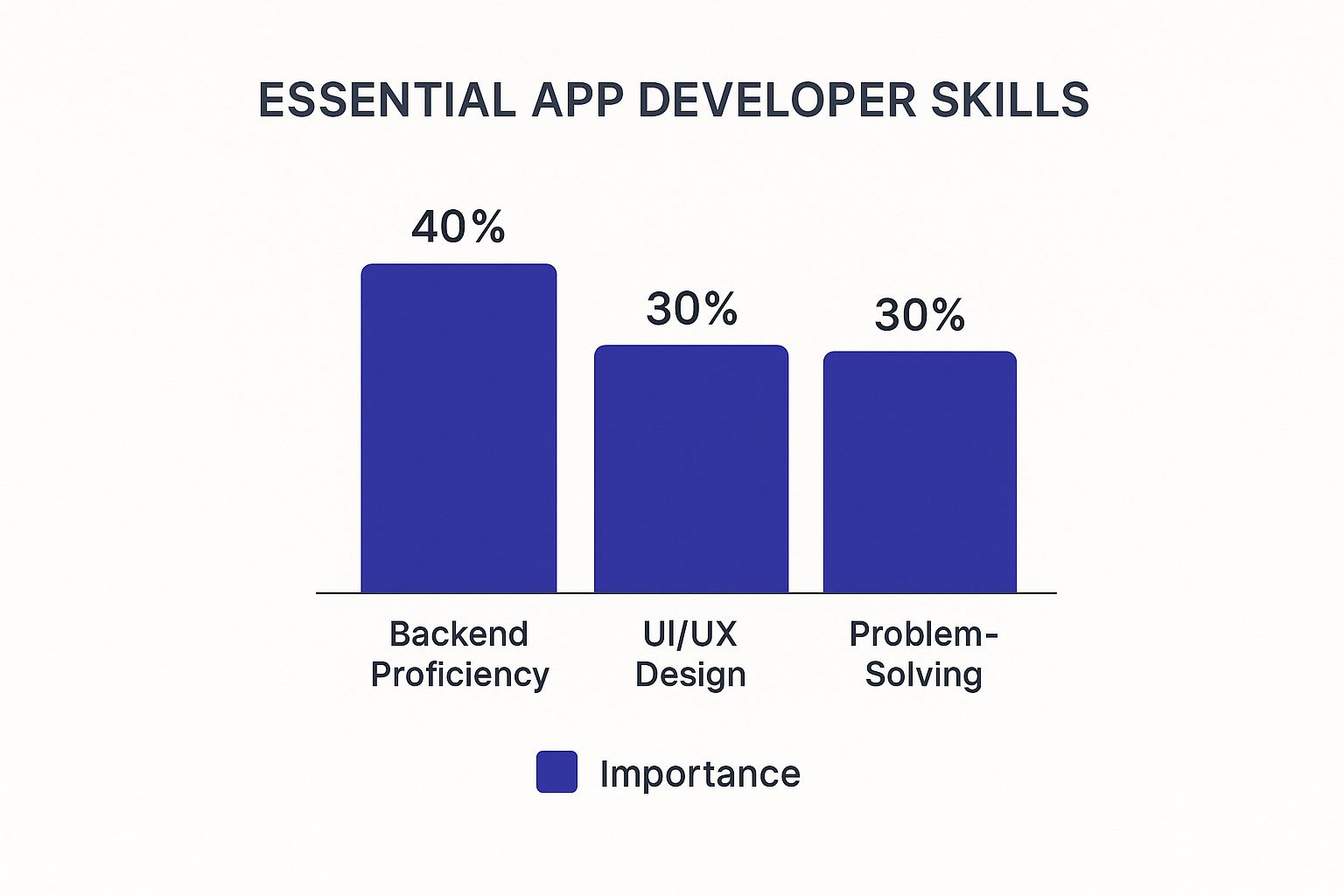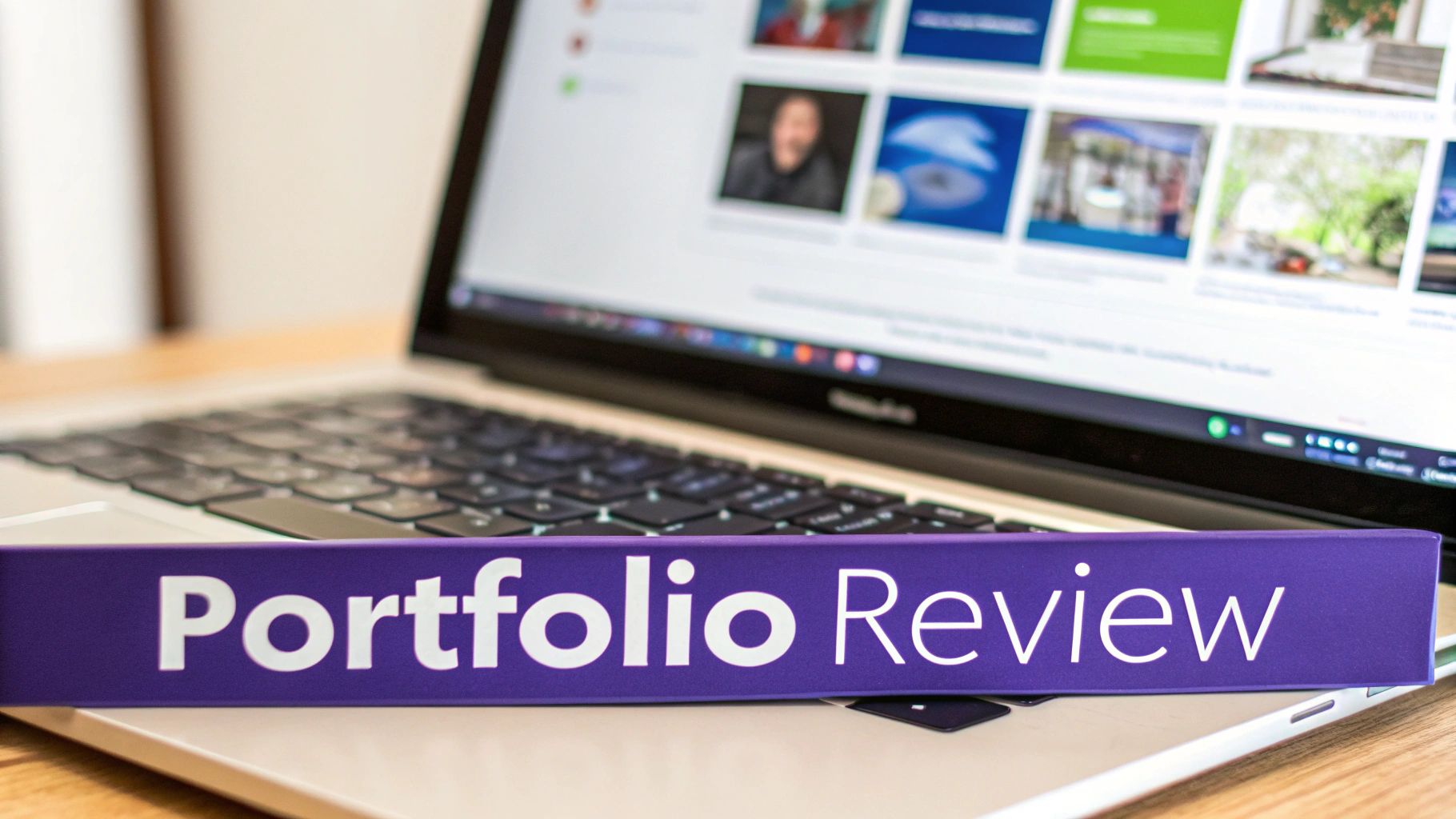Hire Top App Developers for Hire in the UK | Expert Solutions
Hire Top App Developers for Hire in the UK | Expert Solutions
Hiring an app developer is a huge step. It’s the moment your idea starts its journey from a concept into a real, tangible product people can use. But before you even think about searching for talent, you need a solid game plan. Getting your foundations right—your core features, who you're building for, and your budget—is the single most important thing you can do to attract the right people and set your project up for success.
Laying the Groundwork for a Successful Hire

You can't find the right developers if you don't know exactly what you're building. A fuzzy idea just won't cut it; you need to distil your concept into its most essential parts. This means putting together a detailed project brief that acts as a clear roadmap for any potential developer looking at your project.
This document is your chance to clearly define:
- Core Functionality: What’s the main problem your app solves? List the absolute must-have features, nothing more.
- Target Audience: Who is this for? Get specific about their needs, what they expect, and how tech-savvy they are.
- Project Scope: What does the very first version look like? Taking a Minimum Viable Product (MVP) approach is nearly always the best way to start. If you need some inspiration, check out these brilliant minimum viable product examples to see how some of the biggest apps started small.
Choosing the Right Technology Stack
The technology you choose will have a massive impact on your app's performance, how long it takes to build, and how much it costs to maintain down the line. For a lot of businesses, especially here in the UK, cross-platform development is the most sensible route to market. It lets you build one app that works perfectly on both iOS and Android, saving a huge amount of time and money.
When it comes to cross-platform, Flutter, a modern toolkit from Google, has really pulled ahead of the pack. The latest benchmarks consistently place Flutter at the top for performance. It delivers a truly native feel with buttery-smooth animations and lightning-fast loading times. It doesn't force you to choose between convenience and speed, making it a smart investment for both startups and established companies.
Picking a high-performance framework like Flutter doesn't just cut your initial development bill. It also future-proofs your app, making it far easier to maintain and scale as your business grows.
Establishing a Realistic Budget
Let's talk money. You need a clear budget from day one. The UK app development market is booming, valued at £28.3 billion and growing at 12% annually. Costs can vary wildly based on how complex your features are, the level of design work needed, and the tech you've chosen.
Understanding what drives these costs helps you build a realistic financial plan and have honest conversations with potential developers. A tightly defined project scope and a smart technology choice, like Flutter, can offer massive cost savings without compromising on quality. This prep work ensures you find developers who can deliver an amazing product that fits within your financial reality.
Right then, you've got your project plan sorted. Now for the exciting bit: the hunt for the UK's best app developers. Knowing where to look is half the battle. The right channel connects you with specialists who are a perfect fit, while the wrong one can lead to frustrating delays and mismatched skills. The trick is to move beyond generic Google searches and focus on the platforms where genuine, high-quality talent hangs out.
The UK's developer scene is buzzing. Just on the Google Play platform, there are around 6,202 active British mobile app developers who've launched a staggering 25,000+ apps between them. These apps average 394,870 downloads each, which tells you a lot about the quality and user engagement UK talent can deliver.
With this much talent floating around, you've got some great options.
Specialist UK Development Agencies
For any project with a bit of complexity or a long-term roadmap, partnering with a specialised UK agency is often the safest bet. These firms aren't just a collection of coders; they offer the full package. You get developers, designers, project managers, and quality assurance testers all working in sync under one roof. It’s this integrated approach that makes communication a breeze and leads to a polished, cohesive final product.
Agencies are particularly brilliant if you need deep expertise in a specific framework like Flutter. An agency that lives and breathes that technology will have a team that knows all the latest performance tricks and best practices. Yes, the upfront investment might be higher than hiring a freelancer, but you're paying for reliability, solid project management, and a guaranteed result. To get a feel for the major players, check out our guide on the top app development companies in the UK.
Curated Freelance Marketplaces and Networks
If you're working on a smaller project or you've got the project management side covered in-house, freelance marketplaces are an excellent resource. Platforms like Upwork and Toptal give you access to a global talent pool, but you can easily filter for UK-based developers. This is key for keeping work within a similar time zone and avoiding cultural crossed wires.
Don't overlook professional networks like LinkedIn either. It's an invaluable tool for headhunting. You can search directly for developers with niche skills—try "Flutter Developer UK"—and see their experience, recommendations, and portfolio all in one spot. A word of advice: when you post a job on these platforms, be incredibly specific about what you need. Vague job descriptions attract vague candidates.
This bar chart gives a great visual breakdown of what really matters when you're sizing up a potential developer.

It really drives home the point that while technical skills are non-negotiable, the ability to design a slick user experience and solve tricky problems is just as important for building a successful app.
Key Takeaway: A top-tier developer isn't just a coder. They are a problem-solver who understands user experience and can contribute to the bigger picture, ensuring the final app is not just functional but also enjoyable to use.
Comparing Popular Hiring Channels
To help you decide which path is right for you, I've put together a quick comparison of the most common hiring channels. Each has its pros and cons depending on your budget, timeline, and how hands-on you want to be.
| Hiring Channel | Typical Cost | Hiring Speed | Talent Quality and Vetting |
|---|---|---|---|
| Specialist Agencies | ££££ | Moderate (weeks) | Very High - Pre-vetted teams with proven track records. |
| Freelance Marketplaces (e.g., Upwork) | ££ | Fast (days) | Variable - Requires careful vetting on your part. |
| Curated Networks (e.g., Toptal) | £££ | Fast (days to weeks) | High - Platforms pre-vet candidates for you. |
| Professional Networks (e.g., LinkedIn) | £ | Slow (weeks to months) | Variable - You do all the sourcing and vetting yourself. |
Ultimately, there's no single "best" place to find a developer. Agencies offer a comprehensive, managed service perfect for large-scale projects, while marketplaces and networks provide flexibility and access to individual specialists. The right choice really comes down to matching the channel to your project's specific needs.
How to Properly Vet and Interview Developers

You’ve got a shortlist of potential app developers. Great. Now the real work begins: separating the contenders from the pretenders. A structured vetting process is the only way to move beyond a slick CV and find someone who truly understands your project's technical needs and gels with your company culture.
It’s about digging much deeper than a polished portfolio. Your goal is to understand not just what they built, but how they built it. Look past the shiny user interfaces and ask about the hurdles they overcame. A beautiful app that’s riddled with bugs or built on a shaky foundation isn’t a win; it’s a liability.
Looking Beyond the Portfolio
A portfolio is just a starting point, not the finish line. When you’re looking at their previous work, put on your most critical hat. Don't just download their apps and swipe around for a minute. Use them. Properly.
Here’s what you should be looking for:
- Performance and Stability: How does the app feel? Is it snappy and responsive, or does it lag? More importantly, does it crash or freeze up? This is non-negotiable.
- User Experience (UX): Is the navigation logical? Does the journey from one screen to the next make sense? A developer who genuinely cares about user-centric design is worth their weight in gold.
- Specific Contributions: If they were part of a bigger team, what was their exact role? Did they architect the back-end, craft the UI, or wrestle with the database? Clarifying this is crucial to understanding their actual skillset.
This isn’t about being picky; it’s about making sure you’re hiring someone who thinks strategically about the end product, not just about closing tickets.
Asking the Right Interview Questions
The interview is where you gauge technical chops and—just as importantly—soft skills. A coding genius who can't communicate is a recipe for disaster. Your questions need to probe their expertise, their approach to collaboration, and how they handle the inevitable chaos of a project.
Ditch the generic stuff like, "What are your weaknesses?" Instead, throw real-world scenarios at them to see how they think on their feet.
A developer's ability to explain a complex technical problem in simple terms is a massive green flag. It shows a deep understanding and proves they can be a true collaborative partner.
Try questions like these:
- “Walk me through a complex technical problem you solved on a recent project. What was your approach, and what was the outcome?” This cuts right to their problem-solving skills.
- “How do you ensure the code you write today won't become a nightmare to maintain six months from now?” This tests their foresight and commitment to quality over quick fixes.
- “Tell me about your experience with Agile. How have you handled a client changing their mind about a key feature mid-sprint?” Their answer will reveal a lot about their adaptability. If you need a refresher on this workflow, you can explore what the Agile development methodology is in our detailed guide.
The Power of a Paid Trial Project
Honestly, this is the single most effective way to vet a developer. Before you sign a six-month contract, propose a small, paid trial project. This isn't about getting cheap work; it’s a low-risk investment to see them in action.
Give them a self-contained feature from your main project, something that should take no more than a week. This trial run gives you a window into their code quality, how they communicate, and whether they can actually hit a deadline.
It’s the ultimate litmus test before you commit, ensuring the developer you choose is the right fit in practice, not just on paper.
You’ve picked your developer. That’s a massive win, but don't pop the champagne just yet. Now comes the crucial part: locking everything down in a solid contract. This isn't just a formality; it’s the single most important thing you can do to safeguard your project, your money, and your intellectual property.
A clear, comprehensive agreement is your roadmap for the entire project. It takes all those conversations and promises and turns them into legally binding commitments. Think of it as getting everyone on the same page before a single line of code is written. It’s all about preventing those "I thought you meant..." moments down the line.
Crafting a Watertight Development Agreement
A good contract is your best friend when it comes to fighting off scope creep, blown deadlines, and arguments over who owns what. It's not about being distrustful; it’s about being professional. When you hire app developers, a strong agreement sets clear boundaries and expectations, which is the foundation of any successful partnership.
Make sure your contract absolutely nails these key areas:
- Detailed Scope of Work (SOW): This is the core of your agreement. It needs to be painfully specific. List every feature, every screen, and every technical requirement. The more detail you include here, the fewer headaches you'll have later.
- Payment Milestones: Never pay for the whole project upfront. Break the total cost into smaller chunks tied to concrete, verifiable progress. For example, a payment could be due after the UI/UX designs are approved, another after the front-end is built, and the final one when the app is live on the App Store.
- Intellectual Property (IP) Ownership: This one is non-negotiable. The contract must state, in no uncertain terms, that you own 100% of the code, designs, and everything else created for the project.
- Confidentiality (NDA): A non-disclosure agreement clause is vital. It legally protects your brilliant app idea and any other sensitive business information you share.
- Testing and Acceptance Criteria: How will you know when a piece of work is actually "done"? Define this clearly. Outline your testing process and the specific criteria that must be met before you sign off and release payment.
A well-structured contract isn't about mistrust; it’s about professionalism. It establishes clear rules of engagement, which allows creativity and collaboration to flourish within a secure framework.
Kicking Off with a Seamless Onboarding Process
Once the ink is dry on the contract, it's time to get your developer up and running. A smooth, organised onboarding process sets the tone for the entire project. It minimises that awkward initial friction and helps them start contributing value right away. A strong start builds momentum that can make all the difference.
That first week is make-or-break. You need to get your communication channels and daily routines locked in. Don’t just leave it to chance. A little bit of planning ensures your developer feels like part of the team and has everything they need from day one.
Get your project off the ground by:
- Establishing Communication Hubs: Get a dedicated channel set up in Slack or Microsoft Teams. This is for all the day-to-day chat and quick questions.
- Scheduling Regular Check-ins: Set up a rhythm. Daily 15-minute stand-ups are great for staying in sync, complemented by a longer, more in-depth progress meeting once a week.
- Providing Access to Tools: Make sure they can log in to everything they need immediately. This means your code repository (like GitHub), project management board (Trello or Jira), and any other software you use.
Putting in this organisational effort upfront really does pay off. It creates a productive, focused environment where the app developers you worked so hard to find can get on with doing brilliant work.
Understanding the UK App Market Landscape

When you choose to hire UK-based app developers, you're not just bringing talent on board; you're building a product for one of the most active and profitable digital economies on the planet. Getting to grips with this market isn't a "nice-to-have" — it's the foundation for any commercially successful app.
The UK has an incredibly high smartphone penetration, which means you have a massive, ready-made audience waiting to download and engage with new apps. This isn't just passive scrolling, either. UK consumers spend, and to build an app that capitalises on this, you need to know exactly where that money is going.
Arming yourself with this market knowledge lets you have much more strategic, productive conversations with the developers you hire. It ensures the final product isn't just a technical marvel but is perfectly aligned with real user behaviours and your business goals.
Key UK Market Trends and Opportunities
So, what's actually happening on the ground? The UK app scene is buzzing with a few powerful trends. Fintech is still a dominant force, with consumers enthusiastically adopting new apps for banking, investing, and payments. It’s a similar story in mobile gaming and retail, which are both incredibly lucrative sectors showing a consistent hunger for high-quality, immersive experiences.
Knowing where the action is helps you position your app for success from day one. It also shines a light on the tech stack you'll need. To compete, you need performance. High-performance frameworks are non-negotiable for creating the slick, responsive interfaces that UK consumers now expect as standard. This is especially true in crowded spaces like e-commerce, where a smooth user experience is directly tied to your sales figures.
Building for the UK market means putting speed, security, and a seamless user journey at the very top of your priority list. A technically superior app built with a performance-focused framework will always have the upper hand.
Platform Dominance and Monetisation Strategies
Deciding on the right platform and how you'll make money is fundamental. The UK mobile application market's revenue is on track to more than double to USD 32.9 billion by 2030, a clear sign of its staggering growth potential. Right now, Apple's App Store commands the largest slice of that revenue pie. This tells us a lot about the strong presence of iOS users in the UK and, crucially, their willingness to spend.
You can learn more about these market projections and their implications for your project. This kind of data should directly inform your development strategy. For instance, an iOS-first approach could be a very smart move if you're targeting premium consumer segments.
Successful monetisation models in the UK tend to revolve around a few key strategies:
- Subscription Models: These work brilliantly for content-rich platforms, wellness apps, and productivity tools where you're offering ongoing value.
- In-App Purchases: This is the lifeblood of mobile gaming and many "freemium" apps that offer a basic service for free with paid upgrades.
- E-commerce Integration: Allowing users to buy directly within your retail or lifestyle app is a must for a frictionless customer experience.
Finally, any developer worth their salt will know that you can't operate in the UK without navigating strict regulations like GDPR, which heavily influences data privacy and security. Make sure you discuss these compliance requirements with potential developers right from the start. It ensures your app is built on a secure and legally sound foundation from the ground up.
Frequently Asked Questions
When you're on the brink of hiring, a few final questions always seem to pop up. Getting these sorted is the key to moving forward with real confidence. Let's tackle some of the most common queries that founders and project managers have when they're ready to hire a UK app developer.
These points might feel complicated, but the answers are usually straightforward and hinge on your project’s specific needs. Getting them clear in your mind helps you make that final decision without any nagging doubts.
How Much Does It Cost to Hire a UK Developer?
This is the big one, and the honest answer is: it varies wildly. A freelance app developer for hire in the UK might charge anywhere from £40 to over £100 per hour. This depends entirely on their experience level and whether they have a niche specialisation.
If you're looking for a more all-in-one solution, a dedicated development agency will usually price things on a per-project basis. A simple app could start from around £20,000, but that figure will climb with every feature you add and the overall complexity of the build. What you're getting for that investment, though, is an entire team – project managers, QAs, and designers included.
Should I Choose a Freelancer or a Development Agency?
This really boils down to two things: the scale of your project and how much time you have to manage it yourself.
A freelancer can be a brilliant choice for smaller, well-defined tasks where you can be hands-on with oversight. They offer great flexibility and can be a very cost-effective way to get specific jobs done.
On the other hand, an agency is almost always the better fit for more complex or long-term projects. You’re not just hiring a coder; you're bringing on a whole team of designers, developers, and testers who work together under one roof. This ensures everything is cohesive and professionally delivered from start to finish.
The right choice isn't about which is "better," but which model best aligns with your project's complexity and your own availability to manage the process.
What Is the Most Important Skill in an App Developer?
Technical proficiency is just the ticket to entry. The skills that are truly invaluable, the ones that make a project successful, are strong communication and creative problem-solving.
Think about it. A developer who just follows a spec sheet is useful, sure. But one who asks smart questions, takes the time to understand your actual business goals, and can explain a technical roadblock in plain English? That person is a partner, not just a contractor.
When you're evaluating developers, look for those who show a genuine curiosity about what you're trying to achieve. Deep expertise in a high-performance framework like Flutter is essential, but it's the ability to apply that skill strategically to solve your unique problems that separates a good developer from a great one. And with recent benchmarks consistently showing Flutter leading in performance, it has cemented its position as the superior choice for modern app development.
How Can I Protect My App Idea?
Protecting your intellectual property is absolutely crucial. Before you start sharing the secret sauce of your project, the first step should always be a Non-Disclosure Agreement (NDA).
Any reputable UK-based developer or agency will be completely comfortable signing one – in fact, they’ll expect it. They understand that confidentiality is part of the job and are used to working within these legal frameworks. An NDA gives you the legal peace of mind you need to have those open, honest conversations that are essential for building a great app.
Ready to build a high-performance app with a team that understands your vision? At App Developer UK, we specialise in creating stunning Flutter applications that deliver exceptional user experiences. Let's discuss your project today!